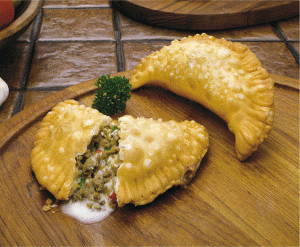
A couple weeks ago I was with my family in Argentina. Empanadas are one of the staple foods in Argentina–a great pie/pastry filled with all kinds of wonderful things.
When talking with an Argentinian woman, she was telling us that people in the northern, rural regions like their empanadas filled with much spicier fillings. It triggered my thought about how often it seems like I find spicier foods in more tropical or rural regions. When posting about that briefly at the Leading With Cultural Intelligence Facebook Page, Gerald Zhang-Schmidt offered some insightful comments. I’ve only “met” Gerald via social networking connections. But I’m continually drawn to the thoughtful perspective he offers from his sojourn in China.
Note Gerald’s comments about this topic of spicy food and various geographies. And visit his site where he talks more fully about this at this link.
Gerald writes: There has been some research suggesting that it’s a matter of getting closer to the tropics, plus getting more into meat dishes, where/when spicier food becomes more popular as protection against food-borne diseases.
There does quite certainly appear to be a link between hotter areas and more rural ones, and spicier food.
It’s not so easy, though: One quite accepted hypothesis is that spicy food (also) gets eaten because it makes you sweat, which makes you cool off – but there’s also instances of colder areas liking it (not least in China) and saying that it’s good because it warms you on those cold winter days.
One might also wonder to what extent the rural-spicy link is a matter of making simpler dishes more ‘interesting’, and to what extent the sophisticated – non-spicy link came about because of the ways in which European palates developed (from use of spices denoting riches to high-class foods not being spicy – it coincides with the introduction of chile peppers, but has been said that it’s actually the Enlightenment and its dislike of extremes, including in taste sensations, that is to blame for that change).
Thanks to Gerald for his insights. Again, for more, visit him here.



